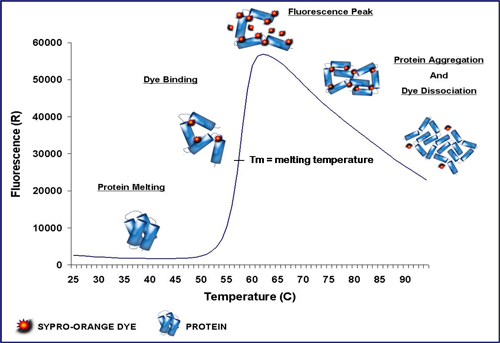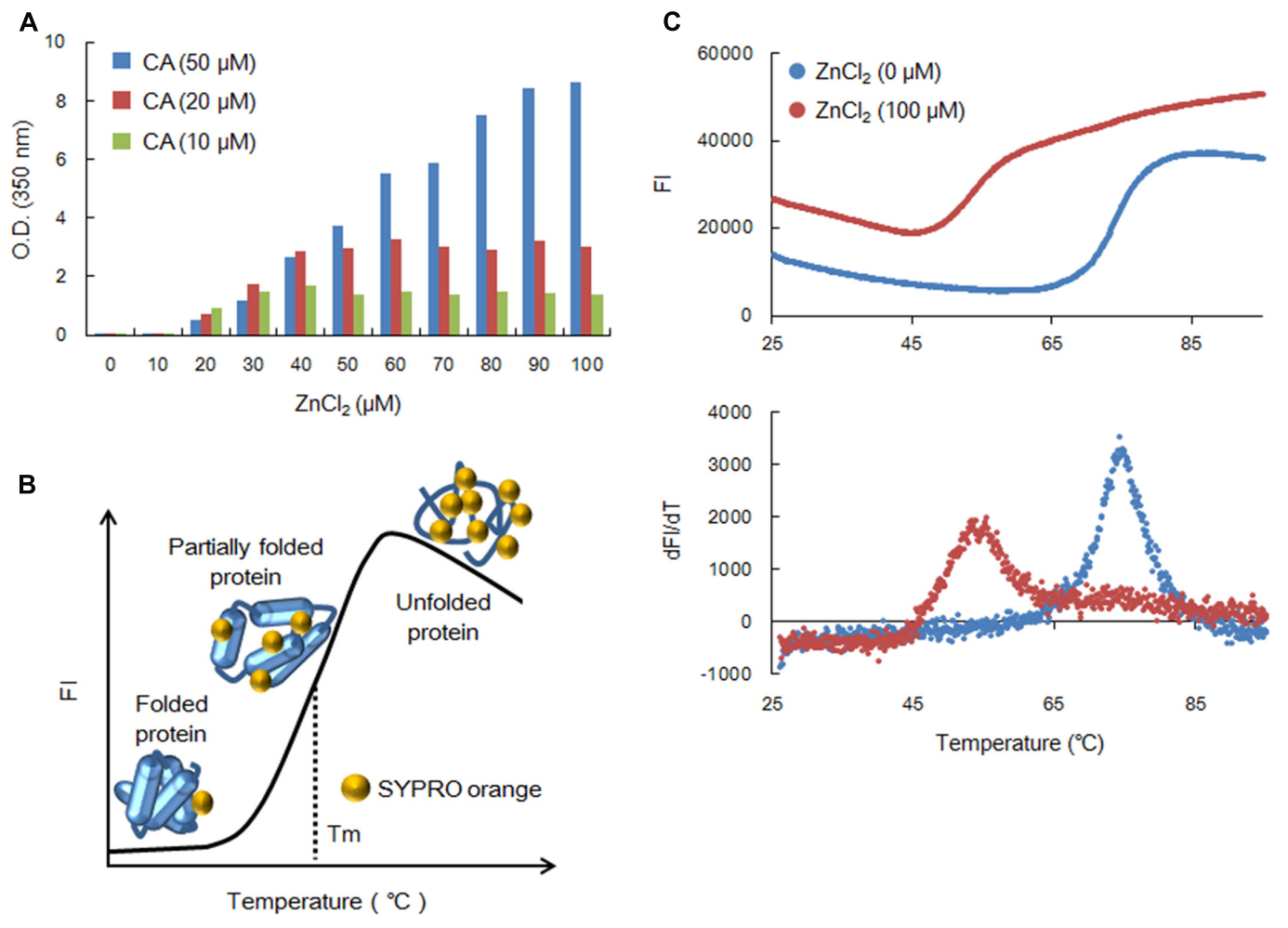Protein Thermal Shift Assay Service
Protein thermal shift assay (TSA) is a cutting-edge technique for assessing protein thermal stability and interactions with small molecule ligands. TSA monitors conformational shifts in proteins across temperature ranges, offering critical insights for drug screening, protein engineering, and biopharmaceutical quality control. Utilizing its advanced analytical platform, MtoZ Biolabs delivers precise and reliable Protein Thermal Shift Assay Service that help clients expedite their research and development objectives.
Technical Principles
MtoZ Biolabs’ Protein Thermal Shift Assay Service employs differential scanning fluorimetry (DSF), the predominant analysis method in TSA. DSF utilizes a fluorescent dye (e.g., SYPRO Orange) to track protein unfolding during gradual heating. As proteins unfold, hydrophobic regions become exposed and bind with the dye, resulting in a fluorescence signal change. By detecting and interpreting the melting temperature (Tm), we can assess protein thermal stability and the impact of ligand binding.

Analysis Workflow
1. Sample Preparation
Combine the protein sample with fluorescent dye, adding small molecule ligands if required.
2. Temperature Gradient Setup
Program a temperature gradient on the real-time fluorescence detector to incrementally heat the sample.
3. Fluorescence Monitoring
Continuously monitor fluorescence changes, constructing a melting curve.
4. Data Analysis
Examine Tm variations to assess thermal stability and binding efficacy.
5. Comprehensive Reporting
Deliver detailed analysis reports containing Tm values, stability data, and binding characteristics.
Service Advantages
1. Advance Analysis Platform
MtoZ Biolabs established an advanced protein thermal shift assay platform, guaranteeing reliable, fast, and highly accurate analysis service.
2. Minimal Sample Volume
Requires significantly less sample than traditional calorimetric methods, lowering costs.
3. Wide Applicability
Effective for analyzing various interaction types, including protein-small molecule and protein-protein.
4. High-Data-Quality
Deep data coverage with strict data quality control. AI-powered bioinformatics platform integrate all protein thermal shift assay data providing clients with a comprehensive data report.
5. Flexible Analytical Options
In addition to TSA, MtoZ Biolabs offers DSC, CD, and FTIR methods, providing comprehensive solutions for diverse research needs.
6. One-Time-Charge
Our pricing is transparent, no hidden fees or additional costs.
Applications
1. Drug Screening: Screens small molecules, assessing their effects on target protein stability.
2. Protein-Ligand Interactions: Evaluates ligand binding impact on protein stability.
3. Protein Engineering: Identifies variants with enhanced stability.
4. Biopharmaceutical Quality Control: Monitors stability under various conditions to ensure product quality.
5. Formulation Development: Establishes optimal storage conditions, enhancing formulation stability.
Case Study
1. Screening of Small Molecules Regulating the Assembly or Disassembly of HIV-1 Capsid Protein by DSF

Miyazaki, Y. et al. Front. Microbiol. 2017.
FAQ
Q1: Can TSA analyze the interactions of multiple protein components in a complex sample?
TSA is generally best suited for single protein stability analysis and small molecule interactions. For samples with multiple proteins, protein separation is recommended to ensure accurate thermal shift data. For complex samples or multiple protein systems, MtoZ Biolabs offers MS-based thermal stability profiling service, ideal for analyzing protein-ligand interactions within complex mixtures.
Q2: How should the ligand concentration be selected, and does it affect the results?
A ligand concentration 3-5 times that of the protein is typically optimal to ensure binding efficacy and accurate detection. Extremely high or low ligand concentrations may influence Tm values and impact result interpretation. MtoZ Biolabs can assist in optimizing ligand concentration based on sample requirements.
Deliverables
What Could be Included in the Report?
1. Comprehensive Experimental details
2. Materials, Instruments, and Methods
3. Total Ion Chromatogram & Quality Control Assessment
4. Data Analysis, Preprocessing, and Estimation
5. Bioinformatics Analysis
6. Raw Data Files
MtoZ Biolabs’ Protein Thermal Shift Assay Service provides end-to-end support, from sample preparation to comprehensive reporting. Our high-sensitivity analysis supports drug discovery, protein research, and biopharmaceutical development, delivering robust, actionable data. Free project evaluation, welcome to learn more details!
How to order?







